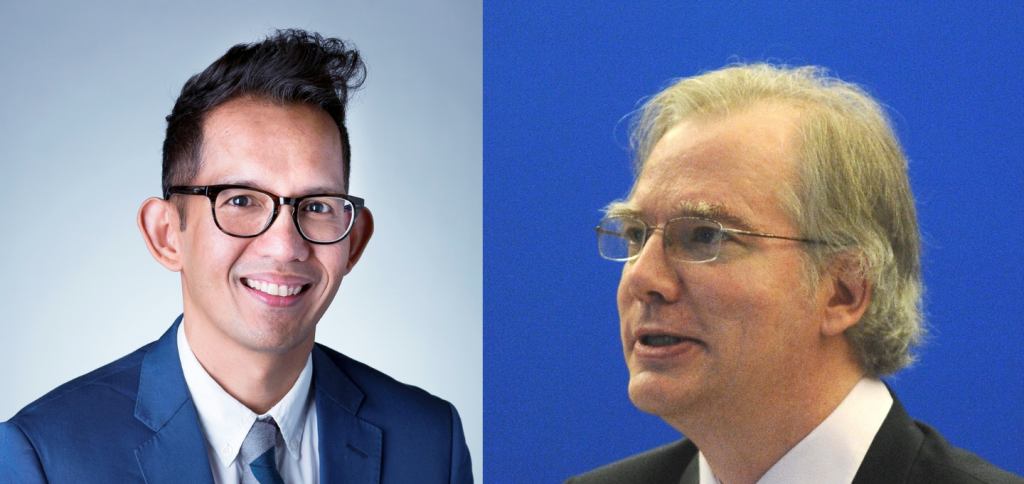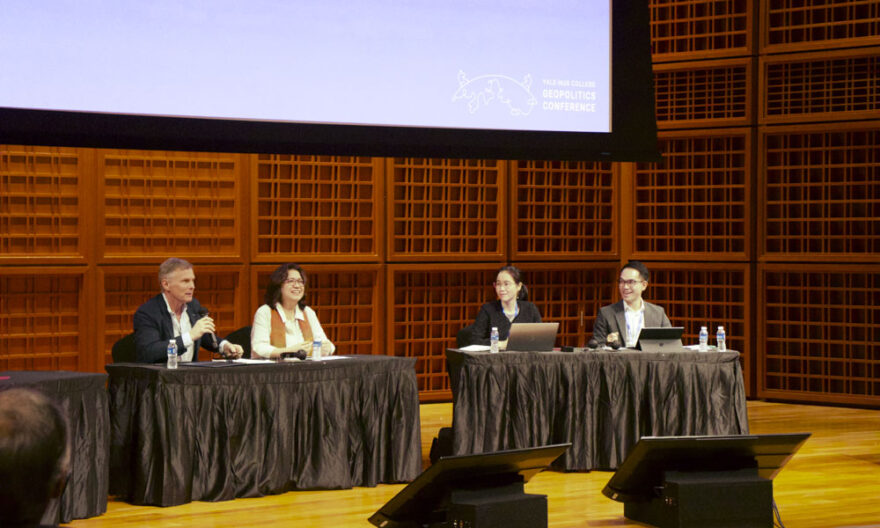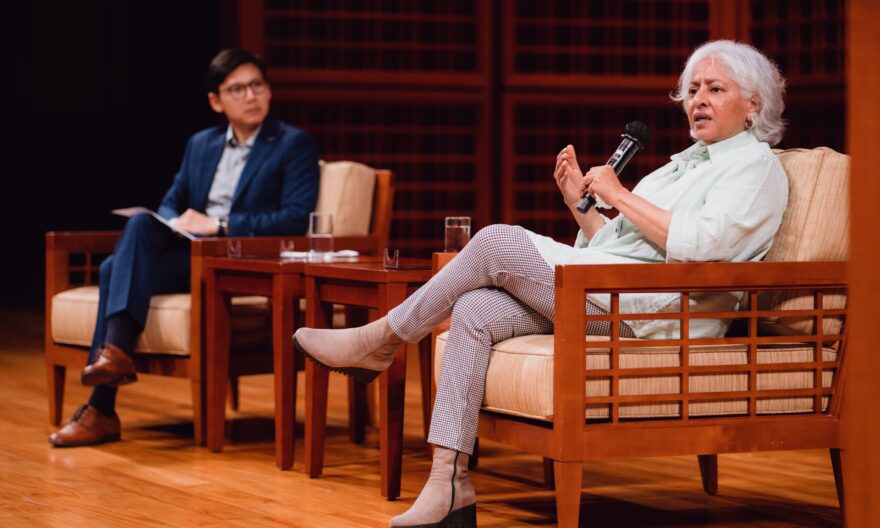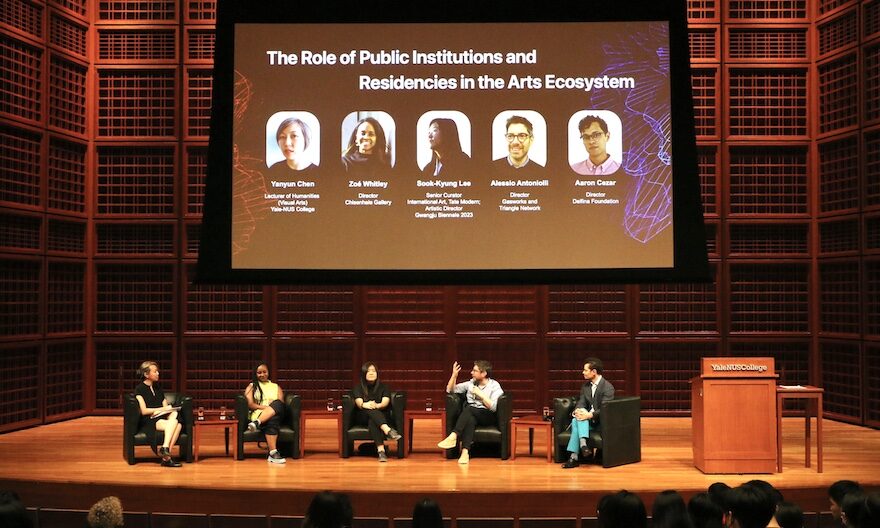Yale-NUS faculty awarded prestigious professorships
The newly appointed professors aim to expand religious studies research and academic offerings at Yale-NUS

From left: Associate Professor of Social Sciences (Anthropology) Nur Amali Ibrahim and Professor Kenneth Dean
Two Yale-NUS College senior faculty received named professorships in recognition of their academic contributions to religious studies in Singapore. Associate Professor of Social Sciences (Anthropology) Nur Amali Ibrahim was awarded the Yap Kim Hao Professorship in Comparative Religious Studies, while Professor Kenneth Dean was awarded the Kwan Im Thong Hood Cho Temple Professorship in July 2022.
The Yap Kim Hao Professorship in Comparative Religious Studies was established in 2014 to enhance religious studies at the College. It is named after Reverend Doctor Yap Kim Hao, former Vice-President of the Inter-Religious Organisation (Singapore) which aims to promote inter-faith dialogue and understanding in Singapore. Rev Dr Yap also served as Convenor of Singapore Interfaith Network on AIDS, Chairman of Chen Su Lan Trust, and Pastoral Advisor of Free Community Church, Singapore.
The new position offers Assoc Prof Ibrahim, who also serves as the Head of Studies of Anthropology, crucial research support in completing several writing projects, including a book that investigates questions of care around low wage migrant workers in Singapore. In his book, Assoc Prof Ibrahim plans to explore the difficulties of separating care from violence and the ethical dilemmas that confront a modern neoliberal society. Previously, Assoc Prof Ibrahim has researched religion and democracy in Indonesia, religious education in Singapore, and religious attitudes towards homosexuality in Singapore, among other topics.
“Beyond the prestige and material benefits, I am most excited by how the position honors the legacy of an individual who has contributed greatly to equality. The late Reverend Yap Kim Hao was a tireless advocate of the marginalised, including LGBTQ+ people and refugees, as well as a proponent of inter-religious dialogue for peace. I hope to always be inspired by his sense of justice in my own work,” Assoc Prof Ibrahim said.
With support from the Professorship, Assoc Prof Ibrahim plans to foster more conversations about religion both in and outside the classroom. “To me, the study of religion is not simply about understanding the major features of particular religious traditions like Christianity or Islam, although this is important,” he shared.
“Rather, the study of religion is crucial to understanding every part of human life: the human capacity for imagination, ethics and morality, politics, economics, law, medicine, technology, the arts, and the environment. When we study religion, we will necessarily explore the complex questions about what it means to be human, cultural differences, and the process of meaning-making. This sort of open-minded exploration and reflection about life is more important than ever in our world today, and I am humbled to be connected to Rev Dr Yap’s legacy.”
Prof Kenneth Dean is also the Raffles Professor for Humanities in the Department of Chinese Studies of NUS as well as the Research Cluster Leader for Religion and Globalisation in the Asia Research Institute.
Prof Dean shared that he was deeply honored to receive the Kwan Im Thong Hood Cho Temple Professorship. The Professorship is supported by the Kwan Im Thong Hood Cho Temple which is dedicated to the Chinese Goddess of Mercy and well-known for its philanthropy.
“Since my field of research is Chinese religion, I am especially delighted to hold this chaired professorship. I have very deep respect for the sustained and substantial philanthropy of this great Singaporean Buddhist temple in the areas of health care, social services, and education,” Prof Dean said.
Prof Dean hopes that this new position will enable him to introduce more students at Yale-NUS, NUS, and across Singapore to the incredible richness and diversity of Chinese ritual life in Singapore. “In my previous research, I mapped out the locations of over 800 Chinese temples in Singapore on my Singapore Historical GIS website. This was a digital archival project which also studied how Singapore was built from the ground up by cultural and religious institutions. By conserving history, the past will not disappear so easily,” he said.
During this professorship, Prof Dean is hoping to complete two follow-up volumes to Chinese Epigraphy of Singapore: 1819-1911, with one focused on temples and regional, clan, and trade associations with dated inscriptions from 1911-2022, and a second on the United or Joint Temples of Singapore.
Prof Dean explained, “There are over 360 temples which are gathered into 68 such United Temples in Singapore. They are full of unique cultural life with temple leaders, spirit mediums, and members who have memories related to the ritual communities and long-lost village life of Singapore. With support from the professorship, I would like to conserve oral histories from these individuals while involving Yale-NUS students in the crucial process of archiving Singapore’s history.”




